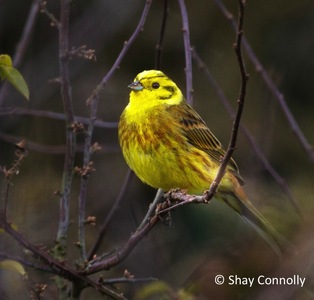20,000 signatures reached
To: Minister for Culture, Heritage and the Gaeltacht, Josepha Madigan
No to More Slash and Burn!

We ask you to reconsider your proposal to change the Wildlife Act to allow for the burning of vegetation in March and the cutting of hedgerows in August and establish proper hedgerow and upland management regimes that works for farming, road safety and wildlife.
Why is this important?
The proposed changes to the Wildlife Act will allow for the burning of vegetation in March and the cutting of hedgerows in August. This decision will have serious impact on a range of wildlife species and habitats in Ireland - especially highly-threatened nesting birds and pollinators found in our hedgerows and uplands.
Our hedgerows are a vital refuge for many native wildlife species in a landscape with little native woodland compared to other countries. Hedgerows provide food, shelter, nesting sites, habitat corridors and are an essential component for flood defenses, preventing soil erosion and the silting of rivers as well as carbon sequestration. Our hedgerows and upland habitats need proper management, though. Landowners and farmers must be supported to manage them in a way that works for farming, road safety and wildlife. Under existing rules, landowners have six months between September and February to manage hedgerows and uplands effectively and there is provision for hedgecutting for safety on our roads. Therefore, this decision is unwarranted, will cause a significant blow to already threatened wildlife species and goes against advice submitted by Birdwatch Ireland, An Taisce and the Irish Wildlife Trust.
The change to the hedge-cutting dates will lead to further declines in populations of Red-listed Yellowhammer, Linnet and Greenfinch birds and reduce essential food supplies for pollinators, of which a third are threatened with extinction.
Our upland breeding birds are experiencing significant declines with several species now of Conservation Concern, including the Red-listed Curlew, Golden Plover and Meadow Pipit. Breeding Curlew have experienced an almost 80% decline in the last 40 years. How sad it will be to lose the Cry of the Curlew in our lifetimes. Many of our upland habitats are of international importance and protected under the EU Habitats Directive. These habitats also provide a range of benefits to humans such as carbon sequestration, water filtration and attenuation to protect against floods. Why then is the Minister supporting any burning in the uplands given the fragile state of its wildlife and habitats? By allowing burning of our uplands into March, nesting activities of sensitive upland ground-nesting birds will be affected along with the breeding success of these populations.
We ask you to join us in our campaign to persuade the Government to reverse this decision before the Heritage Bill 2016, is passed through the Oireachtas. Sign our petition to show your support for the wildlife that do not have a voice. If we do nothing, we risk losing yet more of our natural heritage here in Ireland.
Join us and support “No to More Slash and Burn!”
Our hedgerows are a vital refuge for many native wildlife species in a landscape with little native woodland compared to other countries. Hedgerows provide food, shelter, nesting sites, habitat corridors and are an essential component for flood defenses, preventing soil erosion and the silting of rivers as well as carbon sequestration. Our hedgerows and upland habitats need proper management, though. Landowners and farmers must be supported to manage them in a way that works for farming, road safety and wildlife. Under existing rules, landowners have six months between September and February to manage hedgerows and uplands effectively and there is provision for hedgecutting for safety on our roads. Therefore, this decision is unwarranted, will cause a significant blow to already threatened wildlife species and goes against advice submitted by Birdwatch Ireland, An Taisce and the Irish Wildlife Trust.
The change to the hedge-cutting dates will lead to further declines in populations of Red-listed Yellowhammer, Linnet and Greenfinch birds and reduce essential food supplies for pollinators, of which a third are threatened with extinction.
Our upland breeding birds are experiencing significant declines with several species now of Conservation Concern, including the Red-listed Curlew, Golden Plover and Meadow Pipit. Breeding Curlew have experienced an almost 80% decline in the last 40 years. How sad it will be to lose the Cry of the Curlew in our lifetimes. Many of our upland habitats are of international importance and protected under the EU Habitats Directive. These habitats also provide a range of benefits to humans such as carbon sequestration, water filtration and attenuation to protect against floods. Why then is the Minister supporting any burning in the uplands given the fragile state of its wildlife and habitats? By allowing burning of our uplands into March, nesting activities of sensitive upland ground-nesting birds will be affected along with the breeding success of these populations.
We ask you to join us in our campaign to persuade the Government to reverse this decision before the Heritage Bill 2016, is passed through the Oireachtas. Sign our petition to show your support for the wildlife that do not have a voice. If we do nothing, we risk losing yet more of our natural heritage here in Ireland.
Join us and support “No to More Slash and Burn!”
How it will be delivered
Deliver the petition in person.

